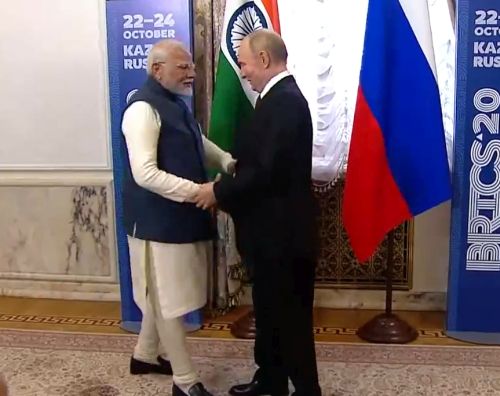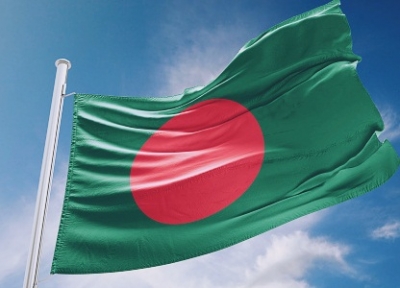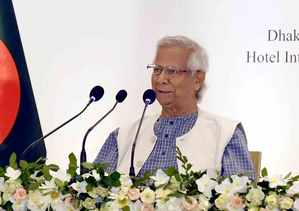International
17 individuals from varied backgrounds to lead Bangladesh's transition
New Delhi, Aug 9 (IANS) The newly formed interim government led by Nobel laureate Muhammad Yunus comprises 17 members, who come from varied backgrounds ranging from former central bank’s governor to ex-election commissioner to law professor to human rights activists and so on.
Here is a brief profile of all the members of the interim government.
Muhammad Yunus
A well-known social entrepreneur, banker, and economist, Muhammad Yunus is also hailed as the ‘father of microfinance’ for founding the Grameen Bank in 1983 and becoming the pioneer of microcredit and microfinance concepts.
In 2006, he and the bank were awarded the Nobel Peace Prize for their work to create economic and social development from below.
Although Yunus was a well-known figure in Bangladesh, he had largely stayed away from the political arena, save one short-lived stint in February 2007, when he founded ‘Nogarik Shakti’ (citizens’ power) before announcing his exit from politics in May 2007.
He also shared a tumultuous relationship with Sheikh Hasina, whom he accused of destroying the legacy of her father and Bangladesh founder, Bangabandhu Sheikh Mujibur Rahman.
Born on June 28, 1940, in Chittagong district, Yunus did his schooling at the Chittagong Collegiate School before earning a bachelor’s degree in economics from Dhaka University.
He later obtained a PhD in economics from Vanderbilt University in the USA on a Fulbright Scholarship in 1969.
Upon returning to Bangladesh in 1972, Yunus became the head of the economics department at Chittagong University.
From 1993 to 1995, Yunus was appointed by the UN Secretary-General as a member of the International Advisory Group for the Fourth World Conference on Women.
He was also a prominent member of the Global Commission on Women’s Health, the Advisory Council for Sustainable Economic Development, and the UN Expert Group on Women and Finance.
Salehuddin Ahmed
Salehuddin Ahmed served as the 9th Governor of the Bangladesh Bank, the country’s central bank, from May 1, 2005 to April 30, 2009. According to media reports, Ahmed implemented reforms aimed at fostering discipline in the banking sector and modernising the central bank’s operations.
He started his career as a lecturer at the University of Dhaka in 1970 and a year later, joined the Civil Service of Pakistan.
Ahmed also served as Director General of Bangladesh Academy for Rural Development from 1993 to 1995. He was the Director General of the NGO Affairs Bureau at the Prime Minister’s Office.
Brigadier General (retd) M. Sakhawat Hossain
M. Sakhawat Hossain was the Election Commissioner of Bangladesh between 2007 and 2012. He was a brigadier general in the Bangladesh Army and has written more than 32 books. He also serves as a columnist and freelance commentator on national and international television as a security and defence analyst.
According to Bangladeshi media, he served on the Board of Directors of Sonali Bank, the largest commercial bank in Bangladesh for two years. He attended NATO exercise in Germany.
Md Nazrul Islam (Asif Nazrul)
Also known as Asif Nazrul, Md Islam is a law professor, researcher and civil society activist. He wrote a number of book chapters and research papers on constitutional, and international legal issues in leading journals and books.
He presented papers at conferences held in the US, Europe and South Asia on constitutional reform, election integrity and good governance issues.
Adilur Rahman Khan
A lawyer by profession, Adilur Rahman Khan is a human rights activist and former Deputy Attorney General for Bangladesh. Since October 2022, Adilur Rahman Khan has been one of the Secretaries General of the International Federation for Human Rights (FIDH).
He has Masters in Law degrees from the University of Dhaka and Vrije Universiteit Brussel.
A.F. Hassan Ariff
A.F. Hassan Ariff held the office of Attorney General for Bangladesh from October 2001 to April 2005. He has been practising in the Supreme Court of Bangladesh since 1970.
He was the Law Adviser (Cabinet Minister) of the caretaker government of Bangladesh from January 2008 to January 2009.
He was enrolled as an advocate of the Calcutta High Court, West Bengal, India in 1967.
Md Touhid Hossain
Md Touhid Hossain is a former Foreign Secretary of Bangladesh.
He was born on February 1, 1955, and had completed his master’s degree in history from the University of Dhaka.
He joined the Bangladesh Foreign Service in 1981. From January 1999 to February 2000, Hossain served as the Principal of the Foreign Service Academy.
Syeda Rizwana Hasan
Syeda Rizwana Hasan is a Bangladeshi lawyer and environmentalist. She is the Chief Executive of the Bangladesh Environmental Lawyers Association (Bela) and a member of the Environmental Law Alliance Worldwide, and the Environmental Law Commission of International Unions for the Conservation of Nature (IUCN).
Additionally, she is a member of the board of the South Asian Network for Development and Environmental Economics (SANDEE).
Supradip Chakma
Supradip Chakma serves as the chairman of the Chittagong Hill Tracts Development Board (CHTDB). He previously worked as Bangladesh’s ambassador to Vietnam and Mexico.
According to Dhaka Tribune, Chakma, a foreign cadre of the BCS 1985 batch, also served in the Bangladesh Embassy in Rabat, Bangladesh High Commission in Colombo, Bangladesh Embassy in Brussels and Bangladesh Embassy in Ankara in various capacities.
Farida Akhter
Farida Akhter, the executive director of UBINEG (Policy Research on Development Options), has carried out extensive research in agriculture, marine fisheries, population, and development issues.
She has written several books and is a regular columnist in national dailies.
Bidhan Ranjan Roy
Bidhan Ranjan Roy Poddar is a Psychiatrist in Mymensingh. His qualifications are MBBS, DPM, and MPhil (Psychiatry). He is the Director cum Professor, Psychiatry at National Institute of Mental Health & Hospital.
Sharmeen Murshid
Sharmeen Murshid, Chief Executive Officer of the election observation group ‘Brotee’.
A.F.M. Khalid Hossain
Abul Fayez Muhammad Khalid Hossain is a Bangladeshi Deobandi Islamic scholar, educator, writer, researcher, editor, international Islamic speaker and social reformer.
He was the professor and head of the Department of Islamic History and Culture at Omargani MES College and central president of the Islami Chhatra Samaj, the student wing of the Nizam-e-Islam Party.
Farooq-e-Azam
Naval commando Farooq-e-Azam is a freedom fighter who was awarded Bir Pratik.
During the liberation war, he was the deputy commander of the team formed under ‘Operation Jackpot’ to attack the Chittagong port.
Nurjahan Begum
Nurjahan Begum was one of the earliest associates of Professor Muhammad Yunus when the latter started the Grameen Bank Project in 1976 in the village Jobra in Chittagong district of Bangladesh.
A student of Chittagong University, Nurjahan played an important role in organising poor rural women in Grameen Bank’s grassroots groups in the bank’s earliest and most challenging days when rural women were hardly allowed to go out of doors and speak to non-relative males, let alone take a loan from an institution.
Nujahan was awarded the Susan M Davis Lifetime Achievement Award 2008 by the Grameen Foundation, World Summit Millennium Development Goals Award 2009, and Vision Award 2009.
Nahid Islam
Nahid Islam is a Bangladeshi student activist who was one of the main leaders of the 2024 Bangladesh quota reform movement, which later turned into the Non-cooperation movement, leading to the fall of Sheikh Hasina’s government.
He was born in Dhaka in 1998 and is a sociology student of the 2016-17 batch at Dhaka University. His father is a teacher and his mother is a homemaker.
Asif Mahmud
Asif Mahmud is one of the key coordinators of the Students Against Discrimination Movement.
Hailing from Comilla, Asif is a Linguistics Department student of the 2017-18 batch at Dhaka University.
He was also the president of the Chattra Odhikhar Parishad of DU.
–IANS
sha/
International
Lee Hsien Yang seeks refuge in United Kingdom

Lee Hsien Yang, the youngest son of Singapore’s founding father, the late Lee Kuan Yew, announced on Tuesday that he is now a political refugee in the United Kingdom after seeking asylum from the British government “as a last resort.”
“I remain a Singapore citizen and hope that someday it will be safe to return home,” Lee stated in a Facebook post, as reported by Channel News Asia (CNA).
Citing what he described as the Singapore government’s “attacks” against him, Lee, who is the younger brother of former Prime Minister Lee Hsien Loong, revealed that he sought asylum protection in 2022.
Lee Hsien Yang and his late sister, Lee Wei Ling, who passed away earlier this month, have been in conflict with their brother Lee Hsien Loong over the fate of their father’s home following his death in 2015, resulting in a public dispute that has estranged the siblings.
In an interview with the UK-based newspaper The Guardian, Lee alleged that a “campaign of persecution” compelled him to seek asylum in Britain.
In response to his claims, the Singapore government stated that there is “no basis” for his allegations of “a campaign of persecution” or other assertions regarding political repression in the country.
“Singapore’s judiciary is impartial and makes decisions independently. This is why Singaporeans have a high level of trust in the judiciary,” a government spokesperson remarked.
The spokesperson added that there are no legal restrictions preventing Lee and his wife, lawyer Lee Suet Fern, from returning to Singapore. “They are and have always been free to return to Singapore,” the spokesperson said.
Lee and his wife have been outside of Singapore since 2022, having opted not to attend a scheduled police interview regarding potential offenses related to providing false evidence in judicial proceedings concerning their father’s will and the family home.
Lee and his late sister, who had been living at the property, alleged they felt threatened while trying to fulfill their father’s wish to demolish the house. They also accused their elder brother, former Prime Minister Lee Hsien Loong, of abusing his governmental influence to advance his personal agenda.
International
Indo-Russian ties are stronger than ever before at BRICS

Kazan, Russia: Prime Minister Narendra Modi held a bilateral meeting with Russian President Vladimir Putin on the sidelines of the 16th BRICS Summit.
During the meeting, President Putin remarked, “I recall our meeting in July, where we had productive discussions on various issues. We’ve also spoken over the phone several times. I am very grateful you accepted the invitation to come to Kazan. Today, we will attend the BRICS Summit’s opening ceremony, followed by dinner.”
PM Modi responded by expressing his appreciation, saying, “I sincerely thank you for your friendship, warm welcome, and hospitality. It’s a great pleasure to visit such a beautiful city as Kazan for the BRICS Summit. India shares deep historical ties with this city, and the opening of our new embassy here will further strengthen these connections.”
International
Laos seeks to enhance nutrition amid climate change concerns

Vientiane (Laos), Aug 22 (IANS) Representatives from the Lao government and development partners have attended a conference here titled “Climate Change and Nutrition in Laos: Intersections and Interventions” to discuss the impact of climate change on nutrition in the Southeast Asia country and potential solutions.
Speaking at the conference, deputy director general of the Department of Hygiene and Health Promotion under the Lao Ministry of Health Viengkhan Phixay, said, “We gather to address a critical and interwoven issue: the impact of climate change on nutrition and how we can work together to tackle these challenges,” Xinhua news agency reported.
The Lao government is actively engaged in this endeavor, with numerous policies and initiatives aimed at addressing both climate change and nutrition, Lao National Television reported on Thursday.
“By leveraging the Scaling Up Nutrition network in Laos, which is led by the government, and supported by civil society, donors, and the United Nations, we have a robust platform to tackle the negative impacts of climate change while improving nutrition and overall health for everyone in Laos,” Viengkham said at the conference held on Monday.
The conference featured a series of presentations that not only detailed evidence-based research but also introduced innovative tools for measuring and enhancing nutrition under the impact of climate change.
The conference stressed the critical need for integrated approaches to tackle the intertwined challenges of climate change and nutrition, and setting the stage for impactful future collaborations.
–IANS
int/psd
International
One killed, seven injured in shootout in Iraq

Baghdad, Aug 22 (IANS) A civilian was killed while seven others were injured on Thursday in a tribal shootout in Iraq’s holy Shiite province of Najaf, according to a local security source.
The shootout erupted in the early hours between armed men from the local tribe in the al-Zarga area in northern Najaf, some 160 km south of Baghdad, a local police officer told Xinhua on condition of anonymity.
The clash resulted in the killing of an Iraqi civilian and the injury of seven others, including three Iranian Shiite pilgrims, the source added.
A joint force from the Interior Ministry’s emergency response division and Najaf provincial police arrested 53 gunmen from both sides of the shootout and seized weapons and ammunition, the Interior Ministry said in a statement.
It added that search operations are ongoing to locate additional gunmen and weapons, with more details to be released later.
The incident took place as numerous pilgrims traveled to the city of Karbala to observe Arbaeen, which marks the end of a 40-day mourning period for the killing of Imam Hussein, the grandson of Prophet Muhammad, in the Battle of Karbala in 680 A.D.
Typically, these pilgrims also visit Najaf as part of their journey to Karbala.
–IANS
int/jk/arm
International
Bangladesh seeks $1 billion budget support from World Bank

Dhaka, Aug 22 (IANS) Bangladesh’s interim government has sought $1 billion from the World Bank as budgetary support.
The call came from the country’s Power, Energy and Mineral Resources Adviser Muhammad Fouzul Kabir Khan’s meeting with Abdoulaye Seck, the World Bank’s Country Director for Bangladesh and Bhutan, in Dhaka on Wednesday.
He made the plea as the ministry owes more than 2 billion dollars to suppliers in import costs of power and energy, Xinhua news agency reported.
Khan mentioned that the interim government, which was formed with many pressing mandates, is due to settle a $2 billion debt left by the previous government in the power sector.
He said they have already suspended activities under the much-criticized Quick Enhancement of Electricity and Energy Supply Act 2010 and abolished the government’s power to set energy prices without any public hearing.
On August 5, the former Prime Minister of Bangladesh, Sheikh Hasina, was ousted from her country and power, ending her rule since January 2009.
This event was seen as a massive escalation, with what initially started as student’s protests and resulted in a major crisis in Bangladesh.
Earlier on August 8, Nobel laureate Muhammad Yunus took oath as the head of Bangladesh’s interim government.
–IANS
int/jk/as
-
Video2 years ago
PM Modi Attacks Congress in Karnataka with “Kerala Story”
-
Politics2 years ago
Siddaramaiah & DK Shivakumar sworn in as Chief Minister & Deputy CM respectively
-
Cricket2 years ago
CSK players rejoice 5th IPL title with their families (Pics)
-
Entertainment2 years ago
Karan Deol weds his longtime Girlfriend Drisha Acharya (Pics)
-
Sports7 years ago
History Of Official FIFA WORLD CUP Match balls
-
India2 years ago
Ashwini Vaishnaw: Railway Board recommends CBI probe in the Odisha railway disaster
-
Entertainment2 years ago
Urvashi Rautela dazzles on Cannes 2023 red carpet (Pics)
-
Entertainment2 years ago
Sunny Leone gets ready for Kennedy premiere in Cannes (Pics)






























